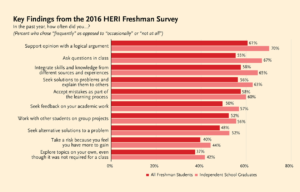The Higher Education Research Institute (HERI) at UCLA recently conducted a survey of college freshmen called The Freshman Survey. This national study revealed something we know to be true anecdotally: independent school children are more prepared for the kind of work colleges require of them than their public school counterparts.
I have spent the last five years as The Academy’s college counselor, and the HERI report acts as a rejuvenating elixir as I assist the Class of 2017 as they submit their first round of college applications. The process – and they can attest to this – is ongoing from August 1st until mid-October, from the time of the release of the Common Application to the final edits on essays and supplements. Thus, reflecting on the attributes of all Academy students is perpetual in my job. I see students ask questions of themselves, their peers, and their teachers. I observe students focused more on improving their work than climbing the rungs of a GPA ladder. I perceive students taking academic risks. Why do they do these things?
When we ask a junior to complete a particularly difficult science lab, a freshman to write a five page paper comparing and contrasting two pieces of literature, or an 8th grader to declaim a speech in front of the entire school, we have their future in mind. When we spend a class period, two class periods, a week or more, having students conduct individual research or work on a group project, we have their future in mind. When one of those students doesn’t meet our expectations or their expectations, we encourage that student to seek our help outside of class. Even then, we have their future in mind.
Our students excel precisely because they are given the space to excel. Our school is not beholden to standardized tests or to curricula determined by an educational conglomerate that’s really a for-profit business masquerading as a college resource.
Here are some of the HERI findings:
I encourage Academy teachers and students to consider how frequently these things happen in their classrooms. I encourage our families and friends who are reading this to ask an Academy student what they think about their classroom experiences, and also to reflect on their own education.
I am now readying myself for the Class of 2018. They’ve been knocking on my door, already excited for what their future might hold. I have seen them come so far – they were 7th graders when I started working at The Academy – and as I look ahead, I see them, as I see the Class of 2017, representing well The Academy’s values and practices, at university and beyond.


